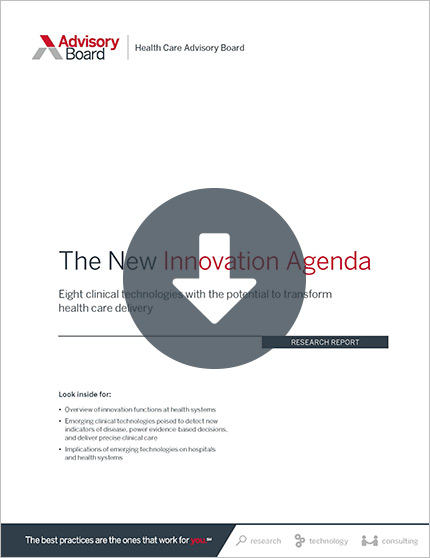Auto logout in seconds.
Continue LogoutBy Deirdre Saulet
Precision medicine is one of the fastest growing fields in health care, with nearly $5 billion in federal funding from the 21st Century Cures Act and millions in private contributions from politicians and celebrities like Michael Bloomberg and Napster co-founder Sean Parker. It's clear that targeted therapies, immunotherapies, and other precision medicine innovations are set to revolutionize cancer care.
To learn more about the latest innovations in medical oncology and get strategies to guide your own precision medicine investment strategy, join us for a webconference on Tuesday, March 20. Keep reading to learn how Intermountain Healthcare tackled two key challenges and is advancing the field to offer more patients personalized cancer treatment by analyzing their genomic makeup.
Barrier 1: Educating patients on precision medicine
Patient education is one of the biggest barriers to the widespread adoption of precision medicine in cancer treatment. Research is advancing at a rapid pace, and many organizations struggle to keep patients informed of the new options available to them and, at a basic level, to explain the principles, risks, and benefits of these therapies.
To ensure patients understand the benefits and risks of genomic testing, Intermountain Healthcare, a 22-hospital health system based in Salt Lake City, made patient education and shared decision-making central elements of its Precision Genomics Cancer Research Clinic.
Intermountain's system automatically refers metastatic patients to its research clinic—giving all patients, not just those in the know, the opportunity to learn more about precision medicine. The clinic is equipped with a library of educational print and virtual reality materials, and patients are encouraged to discuss treatment options with the clinic's team of medical oncologists, nurse navigators, and support staff.
Patients also are able to use Intermountain's proprietary ICG100 Comprehensive Gene Panel, which tests a large portion of patients' genetic code to see if they have one of the more than 160 genetic mutations associated with cancer. Because many clinicians are unfamiliar with these emerging techniques, the system convenes a molecular tumor board to interpret the test results and establish a treatment plan. Once they have established a course of action, patients receive their test results and are informed about their options, including treatment and clinical trials.
Barrier 2: Science is advancing faster than data infrastructure
Another key hurdle to precision medicine is having the infrastructure in place to collect, share, integrate, analyze, and interpret the enormous amount of data generated by the genetic tests.
Intermountain's solution was to partner with Syapse, a precision medicine IT vendor, to develop a rapid learning system that continuously incorporates data in real time. Providers are able to use the system to order genomic tests, receive results, and select the appropriate treatment for their patients. The system follows up with providers to ensure they report patient outcomes during and after treatment. This data is then used to continuously update Intermountain's clinical guidelines.
Intermountain's ultimate goal is to incorporate the data at the point of care and establish a decision support system in which providers who are determining which treatment option is best for their patient will have immediate access to data on how similar patients reacted to each of the suggested treatment options.
Demonstrating a positive impact on patient outcomes
While the challenges may seem immense, Intermountain has seen positive patient outcomes. In a small scale study, Intermountain was able to show that progression-free survival for metastatic patients who receive next-generation sequencing and targeted treatment is almost double that of patients receiving standard treatment. At the same time, costs was comparable for patients in both groups.
Next, join us to learn more about precision medicine
With the rapid growth in molecular diagnostics, targeted treatments, and immunotherapy, cancer providers are able to deliver increasingly precise therapies that improve outcomes and reduce toxicities.
However, to realize the benefits of personalized medicine, cancer providers must make investments in laboratory capabilities, clinical decision support, rapid learning systems, patient education, and clinician training. Join us for a webconference on March 20 to learn strategies to position your cancer program for success in the era of precision medicine.
Don't miss out on the latest Advisory Board insights
Create your free account to access 1 resource, including the latest research and webinars.
Want access without creating an account?
You have 1 free members-only resource remaining this month.
1 free members-only resources remaining
1 free members-only resources remaining
You've reached your limit of free insights
Become a member to access all of Advisory Board's resources, events, and experts
Never miss out on the latest innovative health care content tailored to you.
Benefits include:
You've reached your limit of free insights
Become a member to access all of Advisory Board's resources, events, and experts
Never miss out on the latest innovative health care content tailored to you.
Benefits include:
This content is available through your Curated Research partnership with Advisory Board. Click on ‘view this resource’ to read the full piece
Email ask@advisory.com to learn more
Click on ‘Become a Member’ to learn about the benefits of a Full-Access partnership with Advisory Board
Never miss out on the latest innovative health care content tailored to you.
Benefits Include:
This is for members only. Learn more.
Click on ‘Become a Member’ to learn about the benefits of a Full-Access partnership with Advisory Board
Never miss out on the latest innovative health care content tailored to you.

